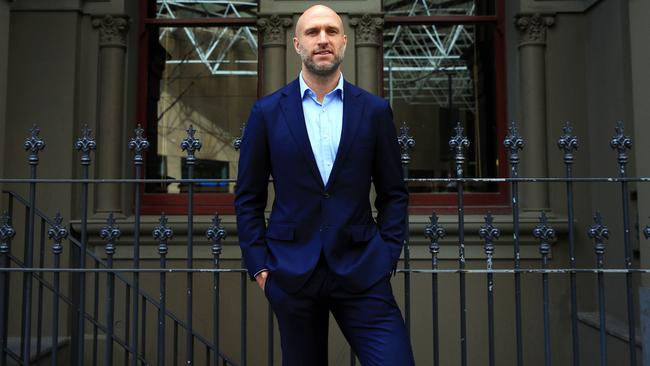Chris Judd sweats over a new game: micro-cap investing
Champion footballer Chris Judd now considers himself a full-time investor, putting his money into dozens of small ASX-listed stocks.

Chris Judd remembers the smell of sweat, signifying that plenty of hard work — and worry and stress — had taken place that day.
He’s not talking about his decorated AFL career, the Brownlow medals or grand final he won with West Coast and the scenes in changerooms after big matches were won or lost.
Instead, the champion footballer is explaining the passion that has become his full-time pursuit since retiring at the end of 2015 after 279 stellar games at the top of his sport.
Judd now spends his time obsessing over micro-cap shares, revealing he has a portfolio of 35 stocks, the majority of which have a market capitalisation of $50m or less.
They are a collection of gold miners or explorers, which account for 40 per cent of his holdings, small telcos and data centre owners and emerging medical companies exposed to ageing population demographics. Judd also reveals he is a big fan of uranium stocks.
He actively trades, poring over broker notes, tunes into management presentations and analyst discussions, turns up to annual general meetings all while striving for small bits of information to gain whatever investment edge he can.
Judd, 36, tells The Weekend Australian he can definitely see the correlations between small and micro-cap investing and elite sport — the competition, the danger, the hard work and the characters involved.
“It has got some horse racing elements to it. I like going to the track as you’ll see lawyers, police, gangsters and sportspeople,” he says. “There are people from all walks of life interested in it and escaping reality, trying to make some money and have some fun.
“The markets are a bit like that. There are all sorts of people, from institutional money to cowboy brokers, mum and dad investors, all these different people who are trying to predict the future. I really love it.”
Obsessing over the market
It is a part of the market clearly not without its risks, where whispers and innuendo can whip up a frenzy of investor interest. Money can be made — and lost — quickly.
In March, as markets were falling around the world and the corporate sector and households went into lockdown, Judd found himself at home with wife Rebecca and their young family spending more and more time obsessing over the market — and leaping in to buy stocks.
“I was set up in this room detached from the house and the kids were at home, and you could almost smell the sweat when you walked in there, such was the stress of March,” he says.
“I did find myself up at 2am watching CNBC. I knew it was a seriously bear market when I was watching one night and Bec said ‘what are the futures doing’ and I said they were down 5 per cent. She replied, ‘well that’s not too bad!” So, it was crazy and I don’t think I’ve ever learnt so much in that six-week period, just because you’re forced to. It was really stressful, as it was for so many people.”
Judd has long been known in the football world for his penchant for reading the business pages rather than the sports section, a habit he says he started early in his football career in the “fishbowl” of AFL-mad Perth as a form of escapism.
That led to investing and then an 18-month career as an analyst at Giant Leap, a Melbourne venture capital fund backed by the wealthy Liberman family that invests in start-ups.
Judd still keeps a toe in the water in football as a Carlton board member and a radio commentator for Friday night matches, but otherwise considers micro-cap investing his full-time job.
He has also developed his own video interviewing series on YouTube and a podcast, featuring chats with a wide variety of fund managers and stock pickers to pick up tips and the nuances of investing and, he says, fill a gap in the Australian market for video finance content.
Judd says the more chats he has the more he realises there is not one right way to invest, but he does have a loose set of his own rules and philosophies.
“I want to invest where the funds aren’t, which are mostly sub-$50m market-cap companies which are too small for funds to invest in because they can’t get enough liquidity,” he says.
Potential edge
“Then the people you are buying and selling from … don’t have the time to do the work on it as you should when you’ve got a full-time job, so it feels like there’s a potential edge there because I am doing it full-time.
“But I try not to have too many rules. I think rules in investing can turn into a jail pretty quickly because it’s like the cricketer who says I’m only going to hit pull shots and if they’re only bowling half-volleys outside off stump you have to learn how to hit a cover drive as well.”
Judd says he does have some large cap blue chip shares in his portfolio, and warrants and commodities futures, but he has about 80 per cent of his investments in companies worth $200m or less on the ASX. In recent years he has turned up among the top 20 shareholders of companies such as tech firm AD1 Holdings, 5G Networks, gold miner Matador Mining, data centre firm DXN and Family Zone Cyber, though Judd says he tends to trade in and out of stocks reasonably regularly.
He is reluctant to reveal his biggest wins, but says he did well selling warrants in bigger gold companies, such as Saracen Mineral Holdings and Evolution Mining, and rolled his profits into smaller gold stocks.
As for ones that got away, Judd lists digital payments company Tyro Payments and sports betting firm Pointsbet as two that, he says, “drive me crazy”.
He says he looked at Pointsbet when its shares hit a record low in late March only for it to go up 30 per cent the next day and keep rising since. He liked Tyro from a thematic point of view of a cashless society during coronavirus even if it would take a short-term hit with cafes closed, but also missed out on its subsequent rise.
Win rate ‘pretty average’
“My win rate is pretty average. About as many shares will go up as they go down but if you get the ticket size right and get the ones that are going to go up and cull the ones that are going down really early, you can make a good return on it. But that’s different in how some other people will invest. It is almost like [venture capital] investing in that way.”
Judd likes small telcos and data centre plays and believes that businesses won’t stop spending on their internet bills, data and cybersecurity services. He also likes gold stocks and medical companies leveraged to an ageing population.
“Most are around long-term themes,” he says. “Gold plays to the issue of fiat currency, clean air in China is linked to uranium or nickel sulphate and cobalt might have another run when the world turns up again. An ageing demographic is a nice, easy thematic that is easy to predict. Automation and robotics and data usage, too. So, it is articulating that through a small cap strategy.”
Uranium investing is not without controversy, and Judd points out that is why he is content to run his own strategy and has no great ambition to one day establish a small-cap fund to invest other people’s money.
“I think uranium is going to have a run in the next six months,” he says. “Depending on which fund you’re at if you went to your investment committee and said I want to invest in uranium, they’ll look at you like an idiot.
“So, you’ve got complete freedom. Some of the best investments I’ve made have been in things that you’re a bit embarrassed to say out loud.
“But it is a lot of fun. And what a time to be investing.”








To join the conversation, please log in. Don't have an account? Register
Join the conversation, you are commenting as Logout